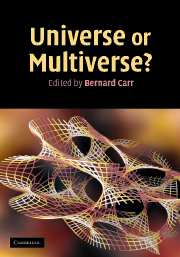Book contents
- Frontmatter
- Contents
- List of contributors
- Preface
- Acknowledgements
- Editorial note
- Part I Overviews
- Part II Cosmology and astrophysics
- Part III Particle physics and quantum theory
- 14 Quarks, electrons and atoms in closely related universes
- 15 The fine-tuning problems of particle physics and anthropic mechanisms
- 16 The anthropic landscape of string theory
- 17 Cosmology and the many worlds interpretation of quantum mechanics
- 18 Anthropic reasoning and quantum cosmology
- 19 Micro-anthropic principle for quantum theory
- Part IV More general philosophical issues
- Index
- References
18 - Anthropic reasoning and quantum cosmology
Published online by Cambridge University Press: 05 July 2014
- Frontmatter
- Contents
- List of contributors
- Preface
- Acknowledgements
- Editorial note
- Part I Overviews
- Part II Cosmology and astrophysics
- Part III Particle physics and quantum theory
- 14 Quarks, electrons and atoms in closely related universes
- 15 The fine-tuning problems of particle physics and anthropic mechanisms
- 16 The anthropic landscape of string theory
- 17 Cosmology and the many worlds interpretation of quantum mechanics
- 18 Anthropic reasoning and quantum cosmology
- 19 Micro-anthropic principle for quantum theory
- Part IV More general philosophical issues
- Index
- References
Summary
Introduction
If the Universe is a quantum mechanical system, then it has a quantum state. This state provides the initial condition for cosmology. A theory of this state is an essential part of any final theory summarizing the regularities exhibited universally by all physical systems and is the objective of the subject of quantum cosmology. This chapter is concerned with the role that the state of the Universe plays in anthropic reasoning — the process of explaining features of the Universe from our existence in it [1]. The thesis will be that anthropic reasoning in a quantum mechanical context depends crucially on assumptions about the Universe's quantum state.
A model quantum universe
Every prediction in a quantum mechanical universe depends on its state, if only very weakly. Quantum mechanics predicts probabilities for alternative possibilities, most generally the probabilities for alternative histories of the Universe. The computation of these probabilities requires both a theory of the quantum state as well as the theory of the dynamics specifying its evolution.
To make this idea concrete while keeping the discussion manageable, we consider a model quantum universe. The details of this model are not essential to the subsequent discussion of anthropic reasoning but help to fix the notation for probabilities and provide a specific example of what they mean. Particles and fields move in a large — perhaps expanding — box, say, presently 20 000 Mpc on a side.
- Type
- Chapter
- Information
- Universe or Multiverse? , pp. 275 - 284Publisher: Cambridge University PressPrint publication year: 2007
References
- 1
- Cited by



